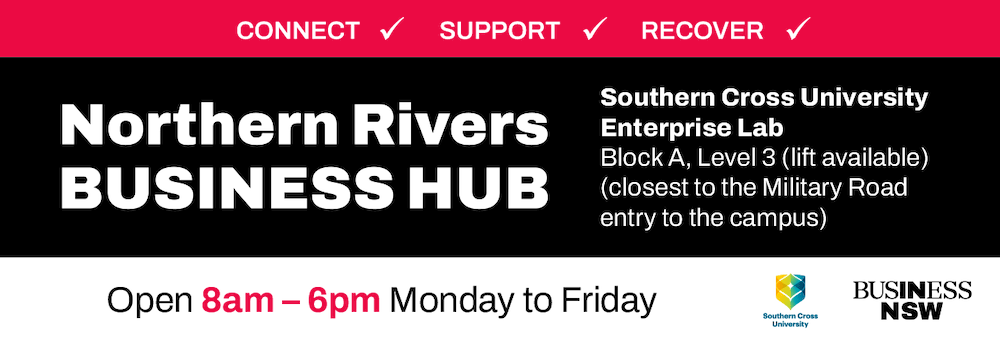Meet The Candidates for the seat of Page following Casino meeting
Simon Mumford
02 May 2022, 10:46 AM
 Candidates from left Thomas Searles, Sue Higginson, Roger Smith, Serge Killingbeck, Patrick Deegan (hidden), Kevin Hogan, Ian Williamson, Heather Mary Smith and Hanabeth Luke. Host Scott Sledge. Photo: Simon Mumford
Candidates from left Thomas Searles, Sue Higginson, Roger Smith, Serge Killingbeck, Patrick Deegan (hidden), Kevin Hogan, Ian Williamson, Heather Mary Smith and Hanabeth Luke. Host Scott Sledge. Photo: Simon MumfordAustralia is less than 3 weeks away from the 2022 Federal Election. With Easter, school holidays, flood cleanup and a six-week campaign you would be forgiven if you didn't know the seat of Page has 10 candidates.
While some are not as high profile as others, the Lismore App wanted to introduce you to the Page field.
In Casino, yesterday afternoon, the first and only complete 'Meet The Candidates' public event took place at the RSM Club. All 10 candidates for the Federal seat of Page were due to grace the stage at an event organised by three environmental groups across the Northern Rivers, however, COVID and illness put a stop to all 10 showing up.
The Greens Kashmir Miller (Sue Higginson proxy), One Nation's Donna Pike (Roger Smith proxy) and the Indigenous - Aboriginal Pary of Australia Brett Rodney Duroux (no proxy) were all struck down by health issues or COVID leaving 7 actual candidates to answer three planned questions plus open questions from the floor.
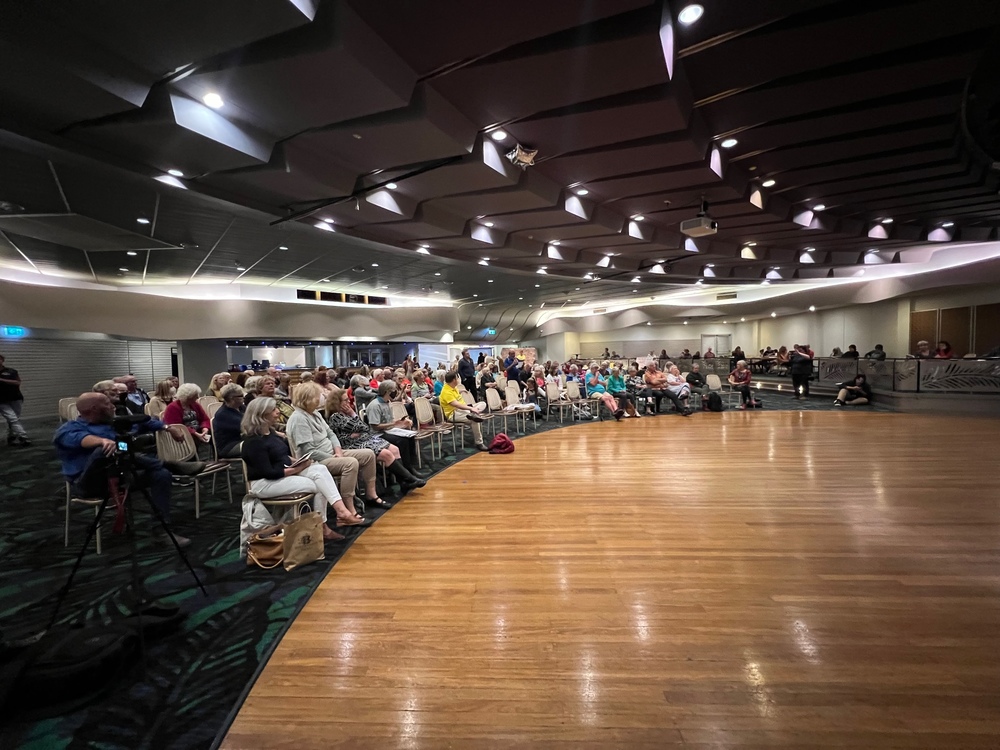
The three questions were:
- The Intergovernmental Panel on Climate Change states that we must transition from fossil fuels now if we are to keep the temperature rise due to global heating below two degrees. If elected what steps will you take to ensure this happens?
- A quote from Nick Dodson when he was the Social Justice Commissioner from 1993 to 1998, "Social justice is what faces you in the morning. It is awakening in a house with adequate water supply, cooking facilities and sanitation. It is the ability to nourish your children and send them to school where their education not only equips them for employment, or reinforces their knowledge and appreciation of their cultural heritage. It is the prospect of genuine employment in good health. It is a life of choice and opportunity, a life free from discrimination. If elected what steps will you take to make Australia an equitable society?
- What do you see as the major challenges facing the electorate of Page? If elected how will you address these challenges?
Each candidate had four minutes to answer and appeared in the order the candidates fronted the lectern which was based on the order of appearance on the ballot paper order for the May 21 federal election.
THOMAS SEARLES - LIBERAL DEMOCRATS
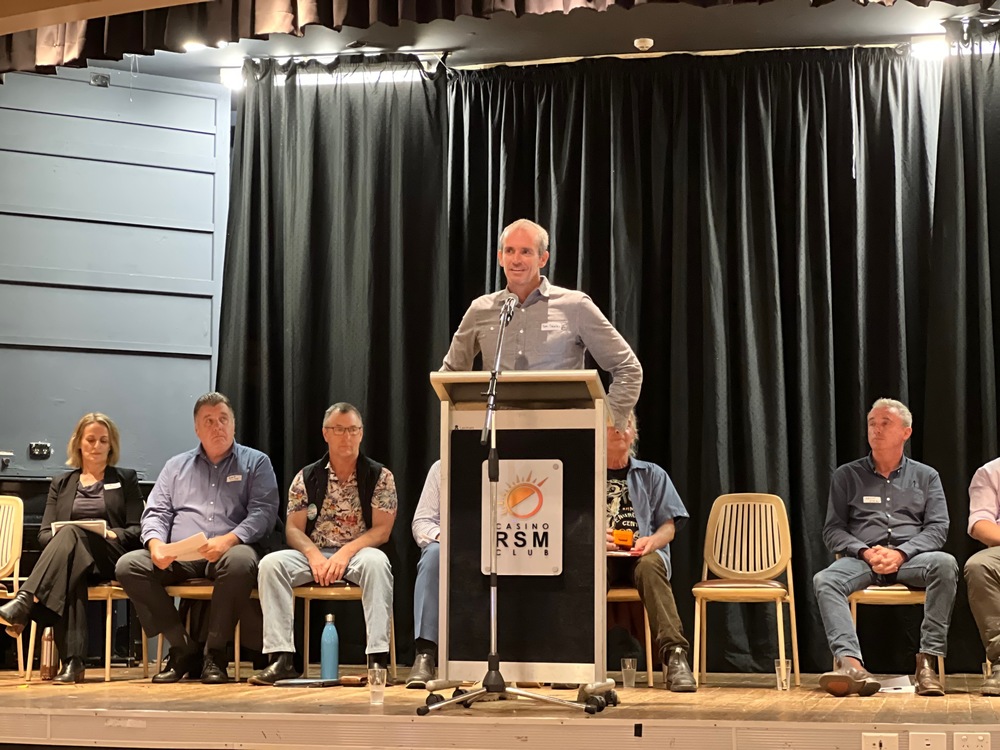
If someone asked me what the greatest threat to our communities which is the third question, I would say without any doubt removal and our freedoms. Our personal freedoms and our community freedom to protect our community. And I certainly think back to the people who have protected our community in the past, whether it be the ANZACS or whether it be the people that fought for freedom its indigenous rights or women's right to vote. There's an endless litany of people who have fought for those freedoms, and I can't help but feel recently, we've given a lot of those away.
Now, none of the things in those questions I would disagree with, I'm not against moving towards incentivising new energies. I'm not against any of the things that were on there about social justice. Of course, I feel very passionately and I work in this area, I'm the President or Director of six different community groups. I worked in bushfires, I worked in floods, and I worked keeping people's jobs and in mental health security during the pandemic. What I'm worried about is the word social justice being used as an umbrella term to take our power away and give it to a global group and finally comes under social justice, and if people didn't know that I actually printed out this document for the United Nations website. This document is titled 'Social justice in an open world - the role of the United Nations'. Now, that's a pretty clear title about what it is. What it talks about, is a ruling class and us. That's what I worry about, that we might be able to determine our environmental consequences of our developments, they will be determined by someone sitting in a castle in Copenhagen or wherever it is, they will have control over us. That's what I'm worried about.
If you read this document, it mentions Karl Marx seven times. It says Marxism failed. The future is through social justice and climate change to redistribute the wealth of the working class. And if you think that's not bad enough, I've got a copy here if anyone wants to have a look. I'll just read out this middle part of this. 'Believers in an absolute truth identified with virtue and justice and neither willing nor desirable companions are the defenders of social justice'. So, what that means is if you value truth, you won't want the people in those power groups having power over your community. You want your community to decide your environmental consequences as I want. And means if you value justice, you're not desirable. That's my big concern.
I work in social justice, I volunteer in these groups, but I'm terribly concerned that what we are doing is handing over our freedoms, handing over the power structure and inverting it, we could protect our communities as we saw fit. The individual had the highest authority, then the community then the nation and last the working groups and think tanks. I don't want them having to drop if they decide that they're going to build that incineration industrial scale factory in Casino. My concern with all of this is that if we're going to protect our environment, we need a hierarchy that is individual freedom first, immunity freedom second and the global groups and the national groups well they can come to us with their advice and we can accept it. All I'd like to consider is, if we hand over our freedom will we ever get it back?
DONNA PIKE - PAULINE HANSON'S ONE NATION (read by Roger Smith a senate candidate)
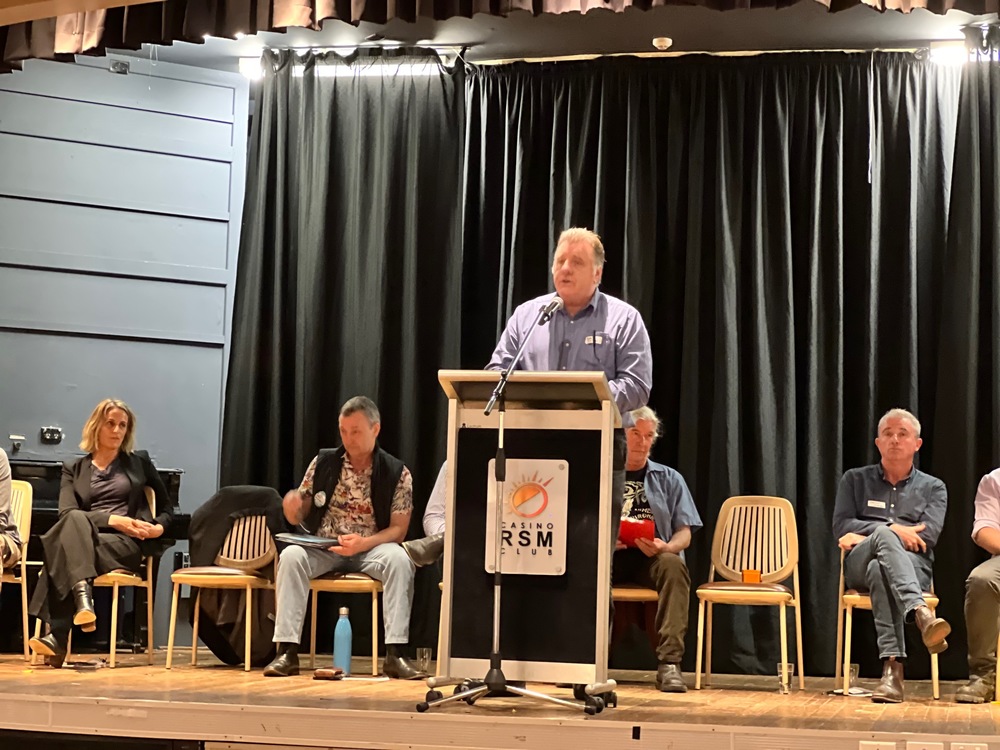
I'm a true Page girl through and through by attending Wiangaree primary school and Kyogle public school. I have lived and worked in Kyogle, Lismore, have lived in Coraki and now live in Moonee Beach. I also have family in Coraki, Casino, Ballina and Woodburn.
I already have a proven track record regarding our environment. In 1989, I was awarded the Coffs Harbour environmental award for being the first person to wash and put rubbish into separate wheely bins that reduce the landfill waste from six bins down to one bin. It went into the local paper here the local council saw it and that led to one award. It also led to the green, red and yellow bin system, which is now widely used all around Australia.
I raise my children to be Earth aware. I'm very proud of our youngest daughter who has completed a double degree an honours degree in Environmental Engineering, majoring in water and a science degree. She has worked on old contaminated factory sites, which was decontaminated and turned into a beautiful wetlands. She has completed a master's degree in teaching.
But our issues in society are not just environmental. We have other very worrying issues and challenges. We have the UN trying hard to implement laws, which will totally supersede our own government laws under the pretence of pandemics. Senator Hanson is wanting us to exit the United Nations which is an amazing stance on saving our lives and something I'm indebted to her for. I cannot praise her highly enough for being brave enough to tackle this issue.
We have people that are homeless, we have drug issues rising exponentially, there is a saturation of gambling ads on evening television. Pensioners cannot afford their power bills and they're left freezing in winter, sweltering in summer and undernourished because their income does not cover their basic living expenses. One Nation's policy to increase pensions is necessary if we ever need to be responsible for the appropriate care of our elderly and our pensioners.
To this day, we see current governments failing everywhere, they are not immediately or appropriately responding to disaster relief which are so obvious during the Lismore floods and prior bushfires.
I'm extremely concerned for local businesses because they are the backbone of our economy. I've walked the streets horrified at just how many empty stores there are in our communities. Government policies have eroded our manufacturing, damaged businesses and taking jobs away from Australians.
I want to share my business understanding, the foresight to support One Nation's initiatives in Parliament so that Australia can prosper and move forward in business.
Our teachers are not properly paid. The education level is lower than it should be and our university students are coming out of education with huge HEX debts. Some of One Nation's amazing policies which you may not be aware of rejected the World Economic Forum's digital identification, banning the sale of firearms, farmland and properties to foreign investors, taxing national companies appropriately, more apprenticeships exit the UN protect and support Australian industries, water security, affordable energy, restoring 90 Day fuel reserves introducing citizen-initiated referendums, pension increase and the lowering of cost of living.
KASMIR MILLER - THE GREENS (proxy was Sue Higginson)
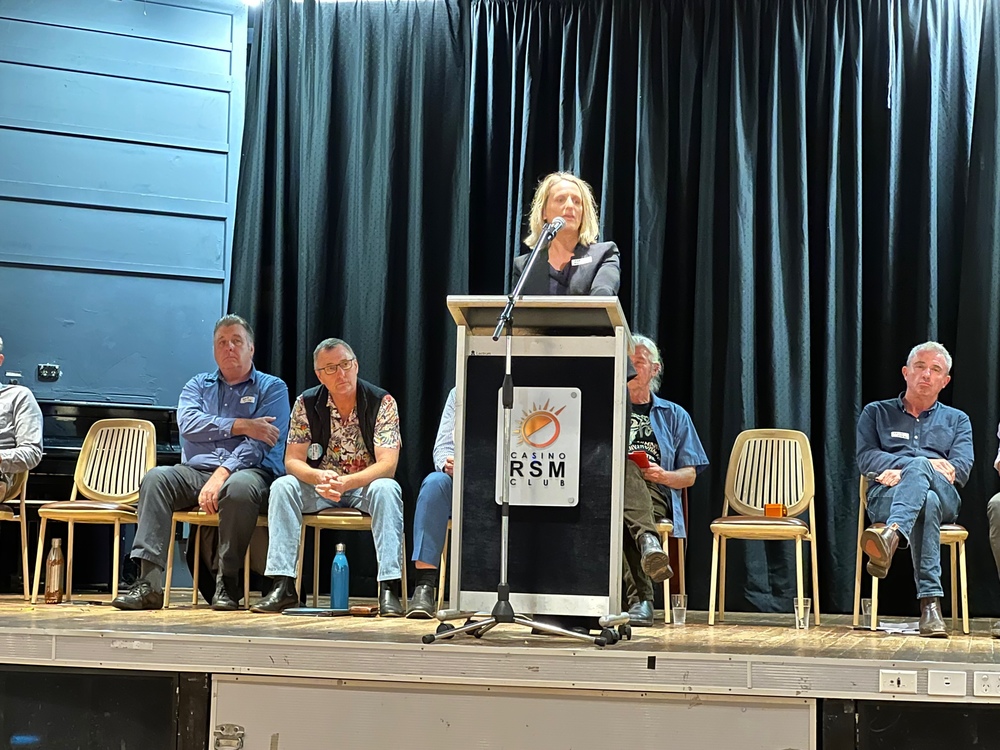
Climate change, climate change, climate change, there is no doubt this is the election of climate change.
The greens are currently the only party that has a proper costed and sensible plan endorsed by experts to tackle this wicked problem. We have a plan that if we managed to obtain the balance of power, which is possible and within our reach, we will balance that power on the basis of a moratorium on all new coal and gas projects. We know that it's fossil fuels that is fueling the climate crisis that we hear in the Northern Rivers know all too well now. It was a climate-induced catastrophic weather event that has caused the catastrophe that we are all now all too familiar with.
We have a proper costed plan to cut through the coal and gas industry to repower the economy through a clean, green and renewable future. We have costed this plan and in fact, the parliamentary costing office has explained that under our plan, I've just this morning Adam Bandt announced this, that we will be $50 billion better off per annum under our plan than the current trajectory that Labor and the current Coalition will take us on. Bear in mind, they have committed to opening 114 new coal and gas projects across Australia. This is reckless, it's dangerous and it's the plan that we stand in the way of. We have a costed, safe, renewable and exciting future. We will reach net zero emissions by 2035 and we will be 100% renewables by 2030.
Beyond the climate crisis, we know that we are experiencing an inequality crisis. We have a plan to tax the billionaires and my word it's a sensible plan. Even Twiggy and Nicola Forest have explained that billionaires are an absurd concept. We need to tax the billionaires. We have a plan, a sensible plan to do this, which will help us do the things that we should do with those billions of dollars and that is putting dental and mental health into Medicare. We have a crisis that people cannot afford the things that they should be able to afford, and that only the rich are being able to access things like dental health, we know how serious and significant it is when we choose not to access dental health because we can't afford it.
And of course, the one policy that was announced this morning by our leader Adam Bandt of the Australian Greens is housing affordability. We have a housing crisis. We are committed, again fully costed, to build a million homes over the next few years. 750,000 social and affordable and community houses and a plan to help first homeowners get into their homes.
HEATHER SMITH - AUSTRALIAN FEDERATION PARTY
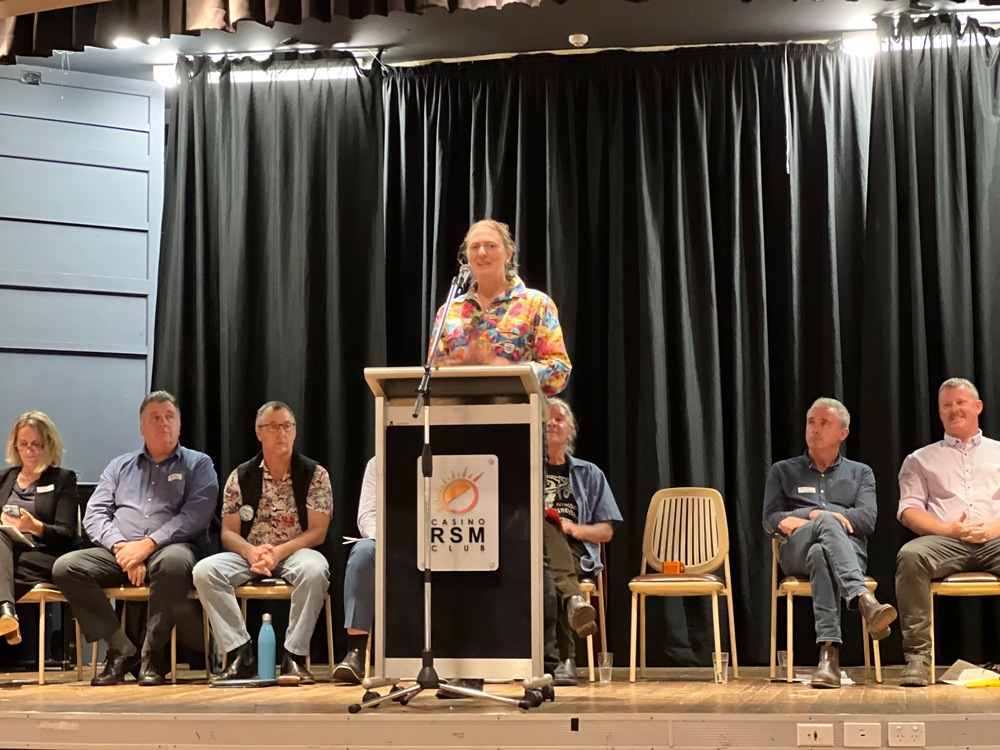
So, I'm gonna try and be cooperative and actually answer the questions posed. And my first point about what we're going to do about fossil energy. The Australian Federation party is about solutions and all round action not about legislation and regulation. So, what we really want to invest in is innovation and removing barriers so that people can invest in a wide range of solutions that are currently being suppressed.
An example of that at the moment is a 1950s research into a product called thorium and thorium has the potential to completely negate and change the scenario of how we produce energy worldwide. It is cheap, it is readily available. Like I said, science was started in the 1950s and there was not a political bill, nor the corporate bill to continue and I'll let you do your own research as to why that might be. The net basis of that is that we could power the entire world for one year with 7000 tradie ute loads off thorium. Just 7000 tons could power the entire world for the year] and at the end of that year, we would have two tradie utes leftover of waste that we would have to geologically keep stable for 300 years. But to do that we would no longer need coal. We've had two ute loads of waste it would cost us no, more coal mining, we would be able to stop using 65,000 plus tons of uranium that we already use. We completely rejig the whole energy conversation. If we can remove the barriers to utilise thorium and finish and finalize the research and the process. You can look up TED talk if you want more information on that.
When it comes to social equity, I believe firmly, that the pathway out of social inequity is personal homeownership. It is the cornerstone of security, of having a roof over your head and it is a cornerstone of being able to build your own financial and independent wealth. And we have not done enough in this country around housing stock and enabling people to get that first step into homeownership and true financial independence.
Sitting alongside of that, and I'm glad Sue brought it up, is the mental health issues we're all facing. Mental health is one of the reasons why people fall through the cracks. It's very difficult to function in society when you don't have good mental health. And I believe that we really really need to invest particularly in what we've gone through over the last five years, not just recently. Mental health is a massive, massive crisis for us to address head on and really invest in.
Alongside that, I actually want to change how we address mental and emotional well being as a society and I'd like to see that introduced as a pure school curriculum from grades one through to twelve. So that we're breaking the cycle of inequity that comes so often out of family situations where children don't get the nurturing or the mentoring and support they need.
The fourth pillar alongside that I want to see change and this is a policy to look up on our Australian Federation Party website, is to completely shift around the family law court. It is destroying families and it is out of that you count inequity so what the Australian Federation party wants to see is a completely parallel system. That is about family separation support and its key aims are providing good outcomes for children and equitable distribution of assets arising from that breakup, and it's not about the law.
The final thing in regards to challenges, obviously, everyone knows about the flood situation, I'd like to see a complete rejig of how we deal with disaster preparedness, response and recovery in this nation. What's happened to you recently is an absolute disgrace and it's a similar disgrace for 2019 bushfires. And the final part I want everyone to consider seriously for the Northern Rivers, is that this is a beautiful part of the world and we need a 50-year vision for what the Northern Rivers is going to look like. 50, 100 years we need to get our sights right out because if I offered everyone a holiday in Australia holiday in this electorate by the end of that holiday, they will want to move here. We are not going to reduce housing supply we are not going to address population growth it will always be a popular place. So, we need to manage that through our own visions and set our own goals to manage our natural assets and balance our population and lifestyle.
PATRICK DEEGAN - AUSTRALIAN LABOR PARTY
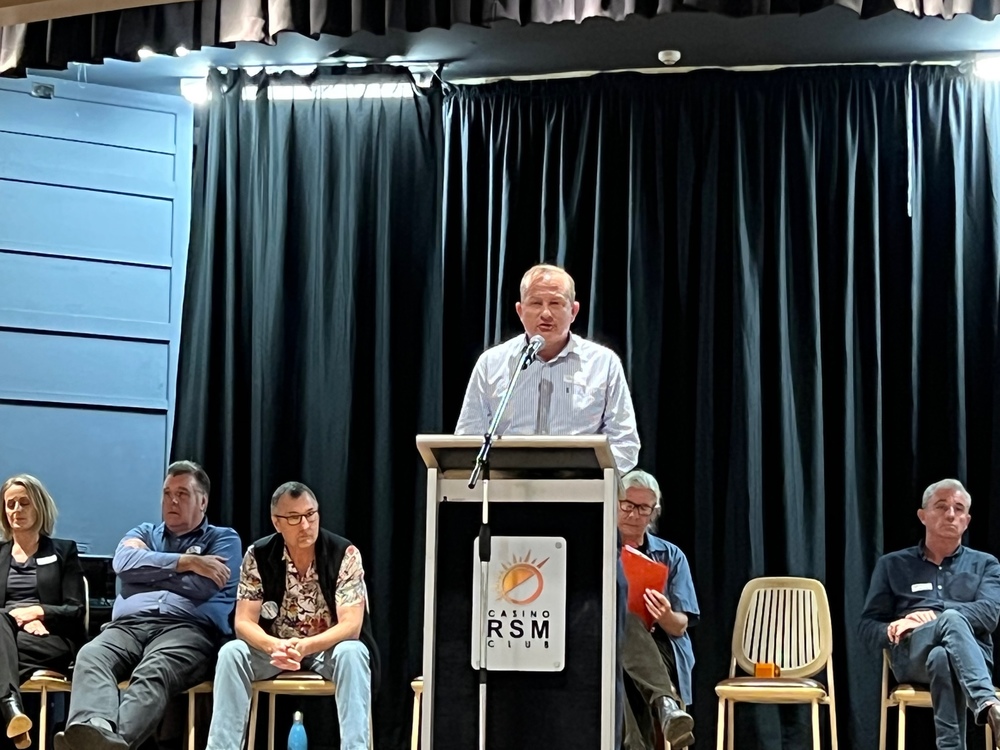
So, Labor is committed to net-zero by 2050 and 43% by 2030. Labor is the only party or candidate that has a sensible plan for transition to net-zero that ensures we address climate change, deliver reliable affordable power for all Australians and ensure workers are not left behind. On one side we have the Greens and others who want to do everything now, while on the other the Nationals and Liberals who want to do the bare minimum. Senator Matt Canavan from the National said this week net-zero was dead. Many coalition MPs spoke in favour of nuclear power as a solution. In a radio interview last year, Kevin Hogan said if you have nuclear power, it's very easy to get to net-zero and that we may have to look at nuclear power. Even more concerning is the nuclear for climate change Australia, who advises the federal government, have identified a number of locations in New South Wales for power plants, including the Northern Rivers and specifically Koolkhan just outside of Grafton.
Labor is at the sensible centre on this issue of addressing climate change. We're committed to a sensible transition that takes real action on climate change, ensures reliable and affordable power supply and a just transition for workers.
Social justice. As it was said my entire working life has been dedicated to helping others, it is an issue close to my heart. Labour has a plan to build 30,000 social housing properties across the country and following the recent floods, we've announced that Page and Richmond will be the first cabs off the rank for this project. We've announced a review of the NDIS to ensure all participants get the funding and support they require, increased funding for domestic violence and homelessness services, strengthening for Medicare and access to GP's, cheaper childcare, ensuring 90% of families have access to the maximum rebate.
We will fix and properly fund the aged care system. Importantly, Labor supports the Uluru statement from the heart. Labor will ensure no one is held back and no one is left behind.
As far as the major issues facing the Page electorate there are so many. Aged care, child care, cost of living, housing, homelessness and job security just to name a few. But the most pressing issue is the response to the floods. Two months on from the worst flooding our region has ever seen, people are still having trouble accessing grants, working out what grants they are eligible for and trying to cut through the red tape. Sadly, this is another example of the government making announcements and not following through. We need to cut red tape for people impacted by the floods. We need a one-stop case management system where people can go to one person, tell their story, give their information and they will access the grants for them.
We need to fund new social housing across Page and Richmond to help with the flood response. Labour supports the announced CSIRO study in relation to the flood and will implement its findings. Labor's disaster recovery fund will not see in a bank account earning interest. Labor will release over $200 million a year to help prevent disasters including flood mitigation. Most importantly, if Labor wins government there will be no interruption for the support available. Labor will hit the ground running, review and group and improve the support that is available now.
IAN WILLIAMSON - UNITED AUSTRALIA PARTY
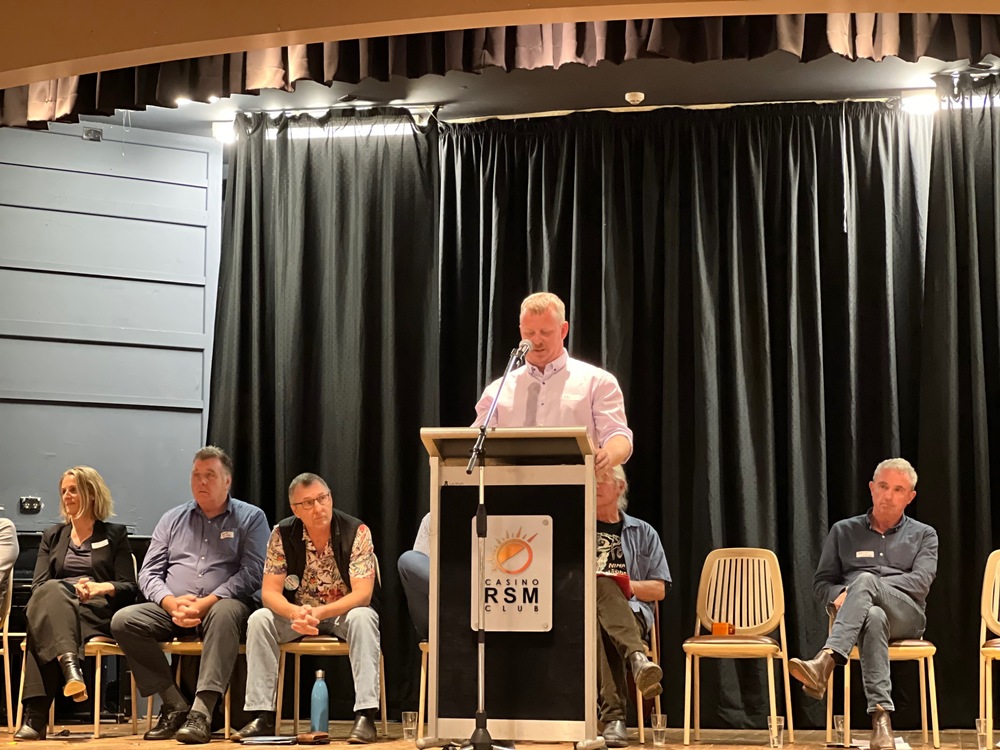
The Australian United Party is committed to building a sustainable energy grid using new and clean energy. Australian coal power stations produce over 100 grams of carbon per kilowatt compared to 12 grams, with nuclear, providing a reliable base load for all Australians without increasing the cost of power and essential to sustainable living for families and extras. Australia did 2.4 billion kilowatts per year producing 24 billion tons of co2 emissions with development. With nuclear we can reduce this to 280 million tons, a reduction of 23 billion tons of co2 emissions.
Social justice. A life of choices and opportunity, a life free from discrimination. In 2020, discrimination was normalized by mainstream media and government to remove people from society if they exercise their choice not to be vaccinated. The current data of 12/04/22 says 83.2% of Australians have been double jabbed equating to 16.8% of the Australian population still able to exercise their free choice. This put into context, 4.2 million Australians have managed to exercise their right to free choice.
As the election is close now and in full swing discrimination has been reduced. This divide has created a two-tier society where people have been removed from careers, university, shopping centers, cafes, clubs, clubs, and a lot more. As we removed people's ability to work, we forced them into poverty. We removed the ability from young adults to access higher education such as universities and such, and the ability of displaced workers to attend TAFE or university to retrain. This is not a life of choice and opportunity, nor is it free from discrimination. No Australian should be discriminated against for any reason.
What are the challenges facing the electorate of Page. All local government areas are in the top 10% of the most disaster disadvantaged LGA's in the state. 30% unemployment in some areas, over $1 billion dollar disaster cleanup, 20,000 displaced residents due to floods, the cost of living rising, understaffed hospitals and aged care facilities, understaffed schools, lack of social housing projects, pensioners living below the poverty line. How long is a piece of string, if I had more time I'm sure I could list a lot more challenges.
The issue I'll be focusing on in the election is housing affordability, and cost of living. This is said to skyrocket again once interest rates rise over the next five years. My first step is to freeze home loan interest rates at 3% for the next five years. This will stall the rise in rent and repayments for all homeowners and renters. The second step would be to remove HEX debt. These debts are held by 2.9 million Australians and we will make education free for future generations. This first step is increasing the age pension by $180 per fortnight for 4.6 million Australians receiving a pension. This in conjunction with investing in Australian super, manufacturing and creating jobs will create a sustainable future for all Australians.
KEVIN HOGAN - NATIONAL PARTY
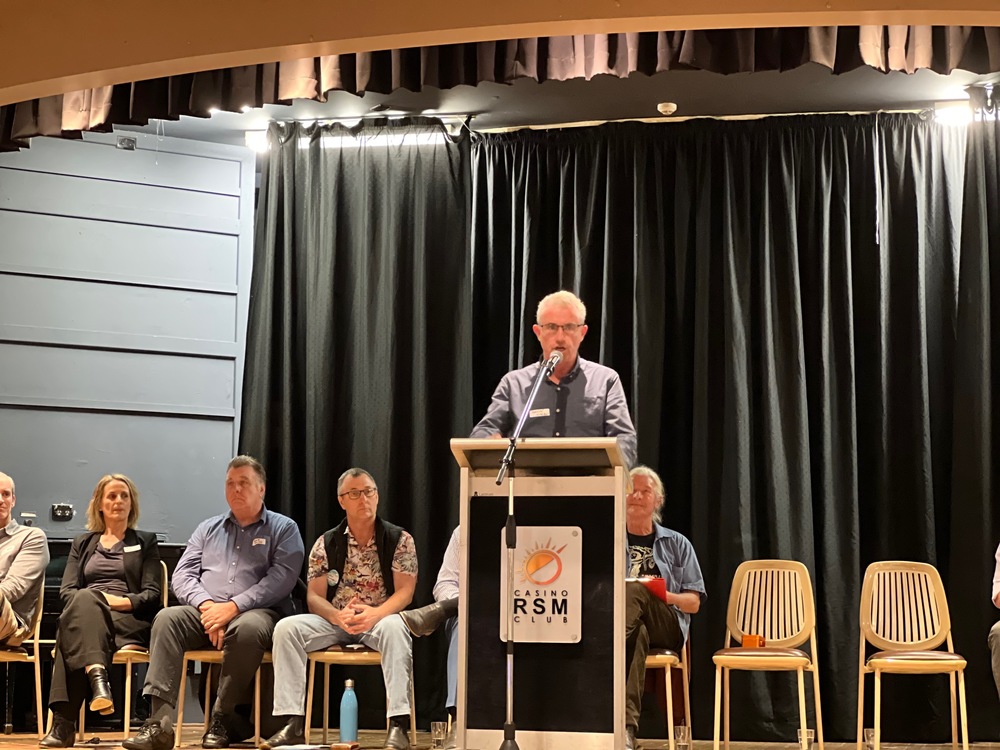
To go through the three questions as they've been put, because we do want to stay on topic to what the group that has kindly hosted this does want us to talk about.
Firstly, with what we have done as a government, I'm going to really keep it mainly to the last eight or nine years what we've been doing and what we do and how we think we're going to make the path to what we're setting. So, what I don't think a lot of people realise is that if you listen to some you would think we're doing nothing in this area. Australia leads the world in renewable energy investment in purchasing per capita terms. So I think that's a very proud thing to do. And to give you one example of how we do that. How does Australia spend more money per capita on renewable energy than any other country in the world? I'll give you one example that stands out. We as a federal government subsidise solar on your roof by over a billion dollars every year and we've been doing that for many years. So that's one of the major ways we do that.
When we came to government in 2013, renewables constituted about 13% of our electricity mix, and that has now got to be nearly 25% since then, and again, solar also wind and other things have done that. Our emissions have fallen 20% to date. We set targets back in 2005, they were called the Kyoto targets, and we set our targets to meet them by 2020. And guess what Australia did. Many countries didn't meet the targets, but we as Australia met those emission reduction targets by 2020. We then set targets for what was called the Paris accord. We set out 2030 targets which we are on track to succeed and we have recently committed, as a government, and we've signed up to net-zero 2050 . We have our plan, especially using green hydrogen to achieve that.
Australia has to play our part and we are playing our part. We have beaten comparable countries, when I say that I say countries have similar economies to us, Canada, New Zealand, Japan, we have lowered emissions more than those countries. So we are not a vacuum here. And I just take as an observation because this is a world issue, not just an Australian issue, there are countries like China and India that are actually putting emissions up every year but certainly as a global player, we need to do that.
The second question related to an equitable society, I mean, I think as a government, we do two things. Why is the federal government important for many reasons, but we have to encourage wealth creation in this country. We have to encourage the wealth that we have as a country, that's very important that the federal government sets the parameters for that on tax and a lot of other things. Then we have to redistribute that wealth and how do we go about and how do we redistribute wealth within our country? We are the 11th biggest economy in the world, and for a population of 25 million that has been an amazing feat. Per person GDP, we are the third biggest economy in the world, per person. So, what does that say? We're an exceptionally rich country, or an exceptionally wealthy country and what that has meant is when we've talked about things like the NDIS, health and all those other issues, aged care, we are spending more money on every sector that we've mentioned, education, health, NDIS aged care, childcare. We're spending more money now than we did last year. We're spending more money than we did the year before and any other year you run to. Above the inflation rate because we have done very well in some sections of creating the wealth in our country.
The third thing, I'm going to keep brief because I know we're running out of time and I normally talk about some other things, I know that you all would be directly affected or no people that have been directly affected by the floods in this region in the last two or three months, which has been exceptionally traumatic for all of us. And I think whoever is successful to be the Member for Page after the next election, one of the biggest jobs that person has is in our recovery. And there's many aspects of that which I'm happy to talk to you all, maybe privately about later. One of them is many, but one of them is a flood mitigation. We have to do many things with I think Patrick alluded to it and it's happy to hear the statement too. We have commissioned a CSIRO to do a study a whole catchment study, and to come to us with recommendations about how we can, you can never flood-proof places but we want to go to the best science and say what do you think are the best environmental and engineering solutions to help us flood mitigate our communities. We have already committed over $200 million to what their findings are because for anyone who's trying to go back into their home and wants to pre-commit money back into their business, they have to be able to do that with some security that we can mitigate those disasters in the future.
HANABETH LUKE - INDEPENDENT
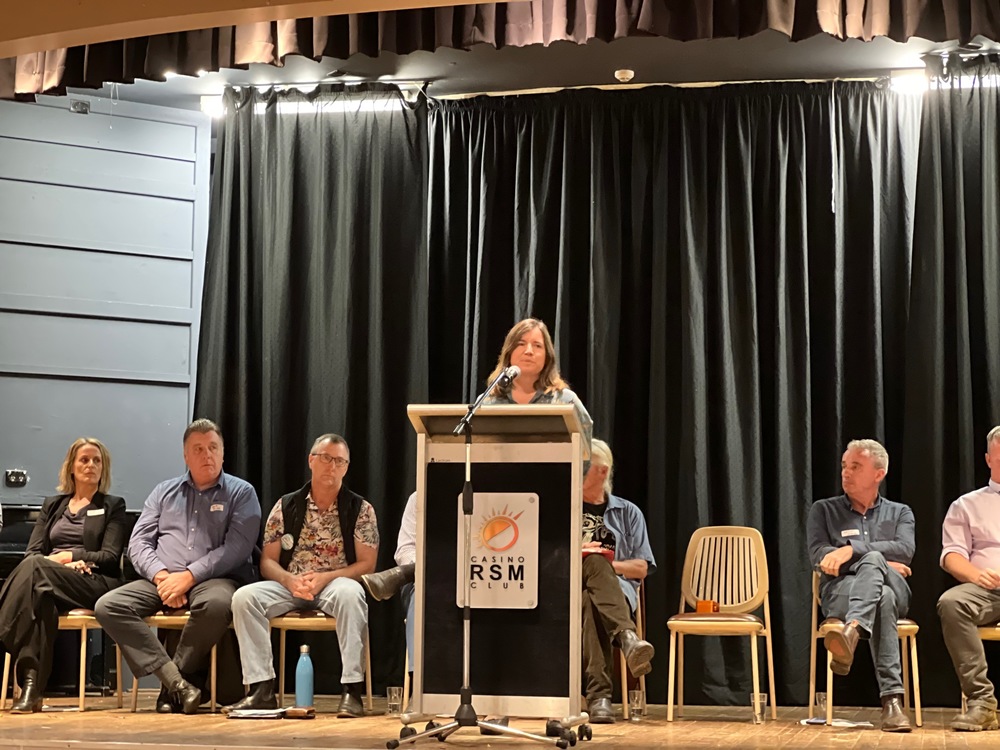
The reason that I chose to stand as the Independent candidate for Page is quite a change. I'm a mother and I'm a scientist, and scientists have been saying for 30 years that we're going to face the kind of disruptions that we've seen in our communities this year and two years ago with fires. Both of those natural disasters impacted my home and my community. But once I chose to stand. as a community independent it is my responsibility to find out what are the key issues across my electorate? Through speaking with people from Kyogle down to Sapphire Beach, to the kitchen table talks and community conversations, it is shocking to understand the depth of poverty across Page. We are the eighth poorest electorate in the country and out of 561 local areas, Casino and Grafton are in the poorest 15 and have been going back under the current government. What that means in real terms is that half the people being paid are earning less than $500 a week.
So, whilst I realise that we must address climate change, and we must do that very soon, people aren't going to be able to address that and think about that unless we also address our housing crisis and poverty. Closely linked in with that is affordable housing, social housing. This is something that has been steadily decreasing, particularly in the regions.
Closely linked in with housing is mental health as well. And I know this because I've spoken with people across the electorate. I know this because I have spoken with leaders across industries and non-government organizations and government organizations from Momentum to Social Futures, the Aboriginal health associations, and also the police as well. The police agree that it's a strong and well-funded health system in terms of our mental health, support for our young people, and housing. Those are the things that keep people out of hospital and keep people out of jail as well. So, in addressing climate change and addressing the things that matter to our region. We actually have to look at that big picture.
The other key things that come out from the people that I've been speaking with, that people want to see changed is integrity in government. And that's why one of the first things that we need to do is address the integrity in our politics. If we can address that, we can ensure that all politicians are held accountable, including me and that comes down to electoral funding, it comes back to having a healthy and independent media. So, our media is free to tell a whole story about what's happening in our country. So, in terms of climate change, this has hit us very hard in the last couple of months and as a community volunteer, I was rescuing my name is in a tinny up at Woodburn. So, I was then a part of the recovery efforts and I saw how much need there is for one, early warning systems and improved disaster preparedness across the region so people know the answer to the vital question, how high do we move on things? Where do we go? How far do we need to move? The other is emergency services that are robust and locally run.
This is absolutely critical that we have well funded and well-resourced emergency services. And of course, we need to address the national housing prices and the local housing catastrophe and this needs to be done through community conversations to bring in the experts together and making sure that we get the right heads around the table so you can get action now. As one of the elders said to me last week, there's been enough talk, we actually need to have action right now.
So as your community independent, I'm here to represent you in Canberra, and make sure that your voices are heard. And that also means striking at the root of the challenges we face which is climate change. I support Zali Steggal's climate act, which represents a sensible transition to a carbon-neutral future, not in 2050 but through working with industry. They've worked out a sensible plan would lead to a 75% cut in our emissions by 2030. And we could aim for a carbon-neutral future by 2035. And that takes not unproven emissions, so questioning technologies such as the Gorgon project, which is a national disaster, but nature-based solutions that support our farmers. Across the world farmers are well-supported, farmers can make a livable wage, through government incentives and subsidies for looking after their land, which is the main thing that they want to do because they know if they look after their land, they will have a productive farm for the future.
So thank you very much for listening, everyone. I think it is time for the independence in Australia to be able to speak up for our regions. The party system has been leaving us behind for too long in every way and I'm here to speak up for our community.
SERGE KILLINGBECK - TNL (formerly the new Liberals)
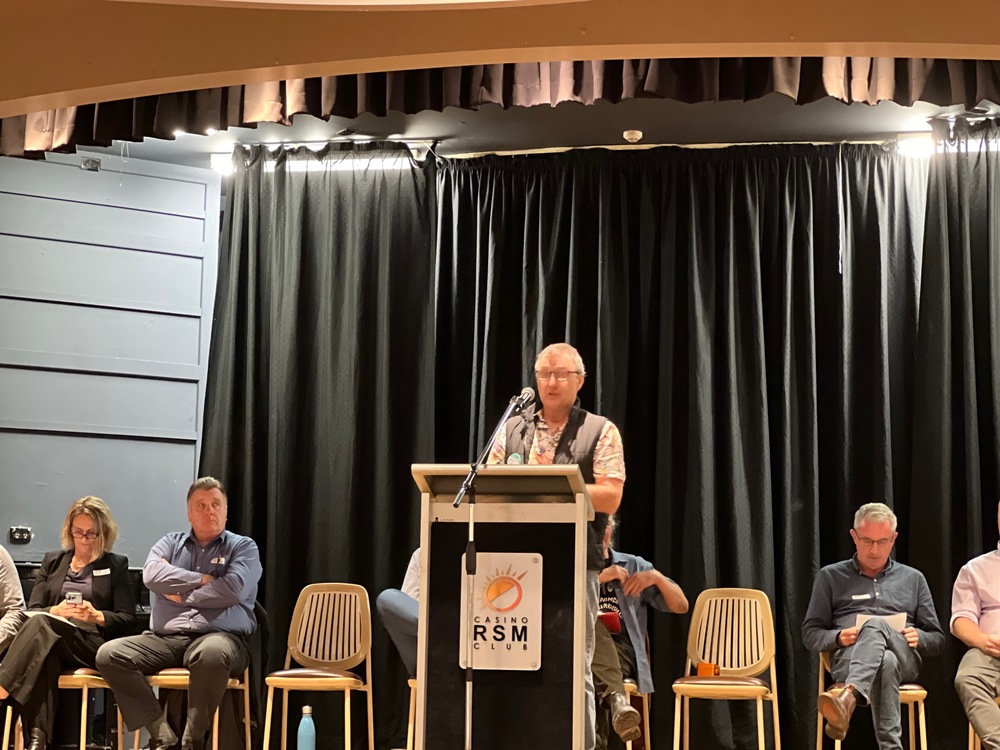
On climate change and emissions reduction, TNL sets the goal of net-zero emissions by 2030. Which I know some years is impossible. However, that's where we have to aim to keep what is going to be a tough time from becoming a disaster. A wrecking ball through our communities, the environment, the economy, and agriculture. A fight we cannot afford to lose. TNL has an extensive climate change response with measures based in adaptation, mitigation, sequestration and elimination. We need to act now, not in 2050, that is too late according to the latest reports from the IPCC. Mother Nature doesn't care what you believe and it is clear from recent events, we are on the front line.
On making housing a more equitable society. Social security and social justice are inextricably linked. We start policy development in this area from the understanding that you can judge a society by the way it treats its most vulnerable. Our policies cover a diverse range of social concerns looking to deliver dignity and agency to vulnerable and underrepresented communities. To ensure all in society are given every opportunity to live an independent and productive life, fully participating in society and welcome.
Our list of policies is long and considered, including but definitely not limited to proper funding and management of the NDIS to deliver timely and effective support. A voluntary job guarantee scheme that provides a living wage, not cheap labour. Providing social security recipients with enough to live in dignity and to participate in society and the economy which I understand is about twice what has been paid now. Our housing policy is based on the notion that the right to shelter has to be the central premise of this policy area. If we are to meet that goal then the cost of housing must fall. We have developed a policy mechanism to do that, which is very complicated and will probably take me quite a bit to explain. Resetting of the relationship between First Nations people and government with a framework based on the Uluru statement from the heart. Treaties with all nations remembering we are a nation of many nations and a constitutionally enshrined voice to Parliament. We can't afford not to.
Finally, a fully independent federal ICAC. That is what we want in an integrity commission slash Commissioner against corruption, call it what you will, you understand what it means. And it must be an administrative tribunal so that it can poke around in those little cesspools just this side of legality. Legislation so that it is independent of government, covering both abuses of power, which are often legal, and corruption, which is the criminal, with the power to bring criminal charges to a specialist corruption court. The ability to not only bring an end to corrupt conduct and abuses of administrative and ministerial of power but to also overturn the decisions and defund the resulting government spending and when necessary, turn those assets over to the public good.
So what is the major challenge for Page? From my perspective? I'm sorry, Lismore based, my perspective is climate change. We've been on the sharp end of it. We are on the front line. As are so many here who have experienced this. We believe our plan to aim for net-zero and 2030 is the right policy setting. The IPCC language has changed in a way I have not seen before and I've been reading their reports since the mid-90s.
In summary, climate change has arrived. Page is an electorate of river valleys and those that dodged in the last climate bullet must be helped to prepare and be ready for when it comes. Those in the Wilsons, Richmond Valleys and the upper Clarence need to be helped to navigate the recovery and determine where we go from here and it's a huge question. I don't think we are ready for what comes next economically, physically or psychologically. The buildings that must come down, possibly in the hundreds, are still standing. I believe it's the government's job to guide that community process and that's not happening really. So, what will I do? Everything I can to get what we need and anyone who knows how government funding works knows the excuse of it's not a commonwealth responsibility, is policy speak not for we can't but we won't.
There was an hour of community questions, however, this exercise was to introduce you to the candidates for the Federal seat of Page and to get an understanding of what they stand for.
The 2022 federal election will be held on Saturday, May 21.
